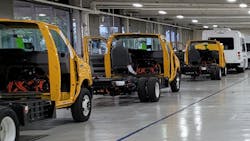Lightning eMotors Execs Tout Production Growth, Land LA Deal
With several recent headlines in the commercial electric vehicle space focused on production delays and big guidance changes, the leaders of Lightning eMotors repeatedly delivered a clear message to go with their third-quarter results: We’re actually making stuff and we’re being paid for it.
Colorado-based Lightning eMotors on Nov. 15 reported a Q3 loss of nearly $50 million that included several large one-time items – adjusted EBITDA was negative $9.3 million versus negative $2.8 million in the prior-year period – on revenues of $6.3 million, a number that comfortable exceeded analysts’ expectations. But CEO Tim Reeser and his team got to tell analysts and investors that their pipeline for electrifying trucks, vans and buses remains strong, that no customers have canceled orders and that they expect to sell up to 60 units in the fourth quarter, up from 43 in Q3. The Q4 number could have been higher still but the global supply chain problems have pushed into early next year another 60 expected sales.
“We believe that Lightning stands out to our customers because of our ability to produce and deliver reliable products, which is a significant differentiator in our end markets,” Reeser told analysts and investors on his team’s conference call, juxtaposing – albeit without naming names – Lightning’s positioning versus that of higher-profile commercial EV peers Arrival and Lordstown Motors Corp.
Reeser also made it a point to note that Lightning eMotors now has three years of experience building and converting electric vehicles and powertrains – the company has shipped 110 units through the first nine months of this year versus 40 in the same period of 2020 – that has it ready to scale up further. His comment was echoed by Chief Revenue Officer Kash Sethi, who said the company’s growing track record has helped it build a pipeline comprising 238 deals.
“We have a lot of real products, so we take every opportunity to put our customers behind the steering wheel and get them to experience the technologies,” Sethi said. “So that's an important part of the sales process. We are doing the heavy lifting there.”
Backing up their optimism, Lightning’s execs on Nov. 16 announced that RideCo has placed an initial order of 10 all-electric vans for the Los Angeles County Metropolitan Transportation Authority. That agency last year launched an on-demand microtransit service to connect outlying LA area with the city’s bus and train network. Lightning’s van have a range of about 120 miles an the company also is providing charging infrastructure as part of its work with RideCo.
Shares of Lightning (Ticker: ZEV) were down about 4% in Nov. 16 trading. Since going public via a merger in May, the stock is up about 17%.
About the Author
Geert De Lombaerde
Senior Editor
A native of Belgium, Geert De Lombaerde has been in business journalism since the mid-1990s and writes about public companies, markets and economic trends for Endeavor Business Media publications, focusing on IndustryWeek, FleetOwner, Oil & Gas Journal, T&D World and Healthcare Innovation. He also curates the twice-monthly Market Moves Strategy newsletter that showcases Endeavor stories on strategy, leadership and investment and contributes to other Market Moves newsletters.
With a degree in journalism from the University of Missouri, he began his reporting career at the Business Courier in Cincinnati in 1997, initially covering retail and the courts before shifting to banking, insurance and investing. He later was managing editor and editor of the Nashville Business Journal before being named editor of the Nashville Post in early 2008. He led a team that helped grow the Post's online traffic more than fivefold before joining Endeavor in September 2021.
